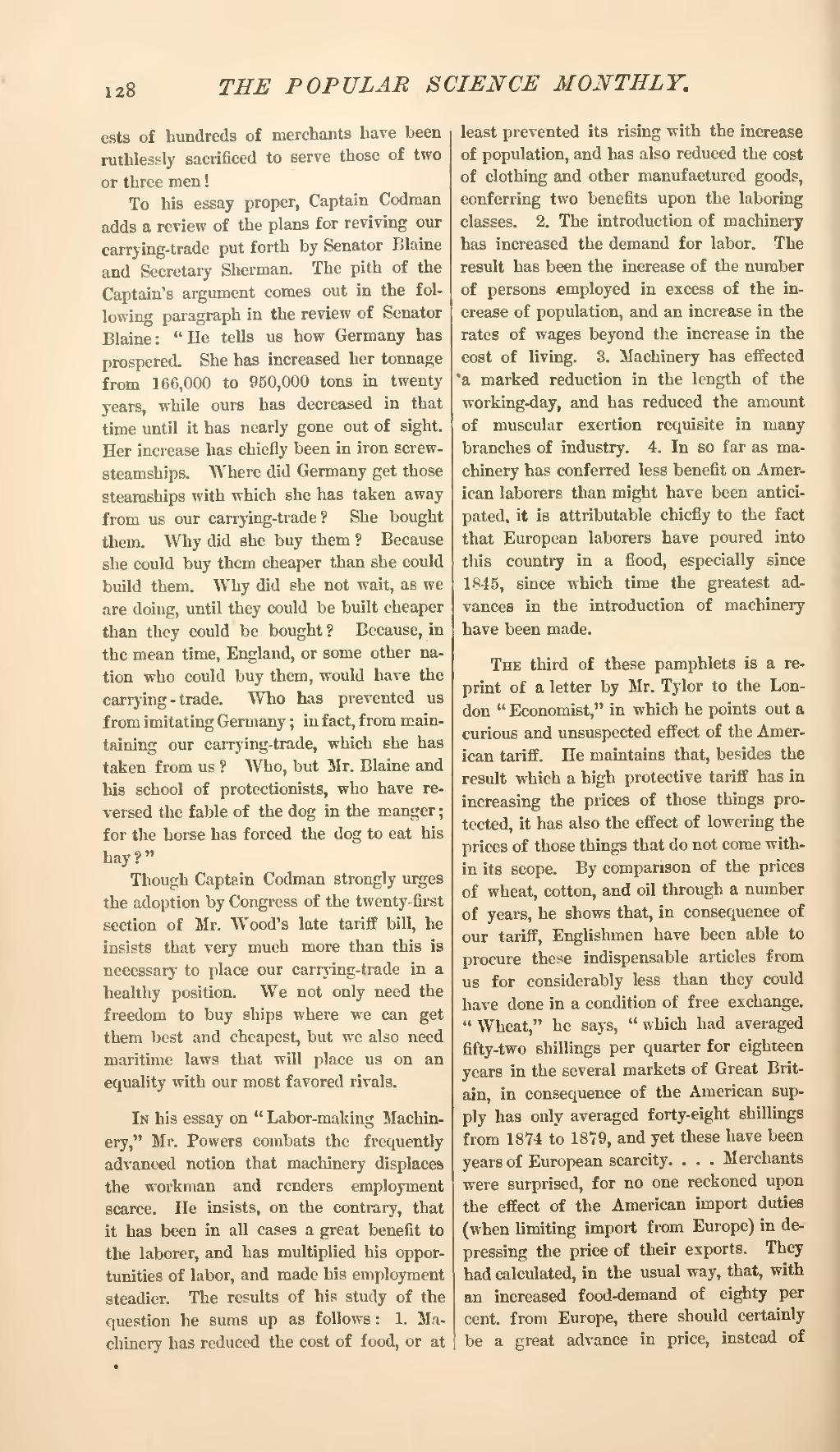ests of hundreds of merchants have been ruthlessly sacrificed to serve those of two or three men!
To his essay proper, Captain Codman adds a review of the plans for reviving our carrying-trade put forth by Senator Blaine and Secretary Sherman. The pith of the Captain's argument comes out in the following paragraph in the review of Senator Blaine: "He tells us how Germany has prospered. She has increased her tonnage from 166,000 to 950,000 tons in twenty years, while ours has decreased in that time until it has nearly gone out of sight. Her increase has chiefly been in iron screw steamships. Where did Germany get those steamships with which she has taken away from us our carrying-trade? She bought them. Why did she buy them? Because she could buy them cheaper than she could build them. Why did she not wait, as we are doing, until they could be built cheaper than they could be bought? Because, in the mean time, England, or some other nation who could buy them, would have the carrying-trade. Who has prevented us from imitating Germany; in fact, from maintaining our carrying-trade, which she has taken from us? Who, but Mr. Blaine and his school of protectionists, who have reversed the fable of the dog in the manger; for the horse has forced the dog to eat his hay?"
Though Captain Codman strongly urges the adoption by Congress of the twenty-first section of Mr. Wood's late tariff bill, he insists that very much more than this is necessary to place our carrying-trade in a healthy position. We not only need the freedom to buy ships where we can get them best and cheapest, but we also need maritime laws that will place us on an equality with our most favored rivals.
In his essay on "Labor-making Machinery," Mr. Powers combats the frequently advanced notion that machinery displaces the workman and renders employment scarce. He insists, on the contrary, that it has been in all cases a great benefit to the laborer, and has multiplied his opportunities of labor, and made his employment steadier. The results of his study of the question he sums up as follows: 1. Machinery has reduced the cost of food, or at least prevented its rising with the increase of population, and has also reduced the cost of clothing and other manufactured goods, conferring two benefits upon the laboring classes. 2. The introduction of machinery has increased the demand for labor. The result has been the increase of the number of persons employed in excess of the increase of population, and an increase in the rates of wages beyond the increase in the cost of living. 3. Machinery has effected 'a marked reduction in the length of the working-day, and has reduced the amount of muscular exertion requisite in many branches of industry. 4. In so far as machinery has conferred less benefit on American laborers than might have been anticipated, it is attributable chiefly to the fact that European laborers have poured into this country in a flood, especially since 1845, since which time the greatest advances in the introduction of machinery have been made.
The third of these pamphlets is a reprint of a letter by Mr. Tylor to the London "Economist," in which he points out a curious and unsuspected effect of the American tariff. He maintains that, besides the result which a high protective tariff has in increasing the prices of those things protected, it has also the effect of lowering the prices of those things that do not come within its scope. By comparison of the prices of wheat, cotton, and oil through a number of years, he shows that, in consequence of our tariff, Englishmen have been able to procure these indispensable articles from us for considerably less than they could have done in a condition of free exchange. "Wheat," he says, "which had averaged fifty-two shillings per quarter for eighteen years in the several markets of Great Britain, in consequence of the American supply has only averaged forty-eight shillings from 1874 to 1879, and yet these have been years of European scarcity. . . . Merchants were surprised, for no one reckoned upon the effect of the American import duties (when limiting import from Europe) in depressing the price of their exports. They had calculated, in the usual way, that, with an increased food-demand of eighty per cent, from Europe, there should certainly be a great advance in price, instead of

